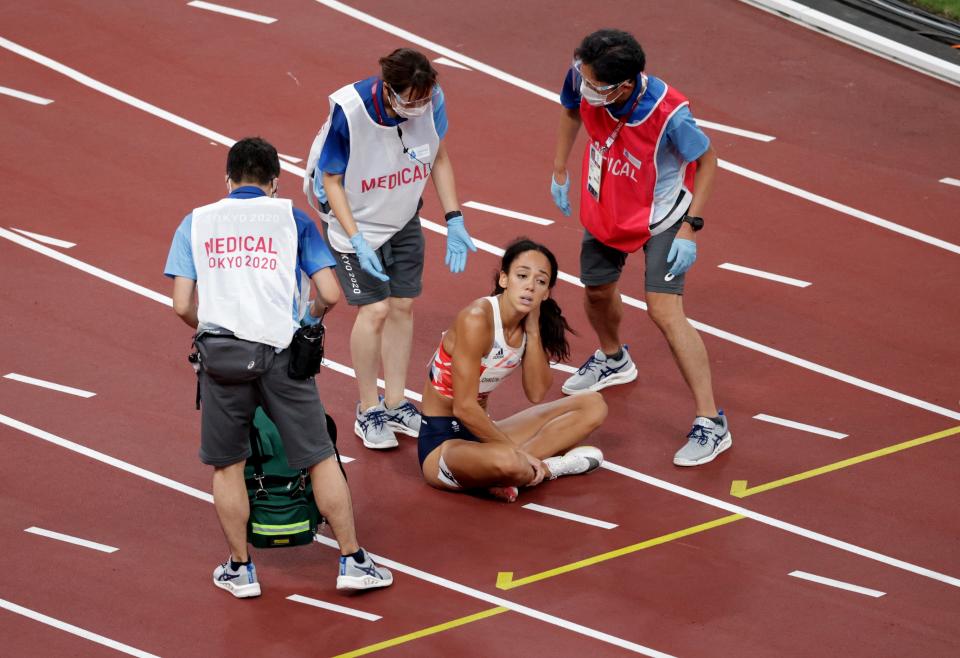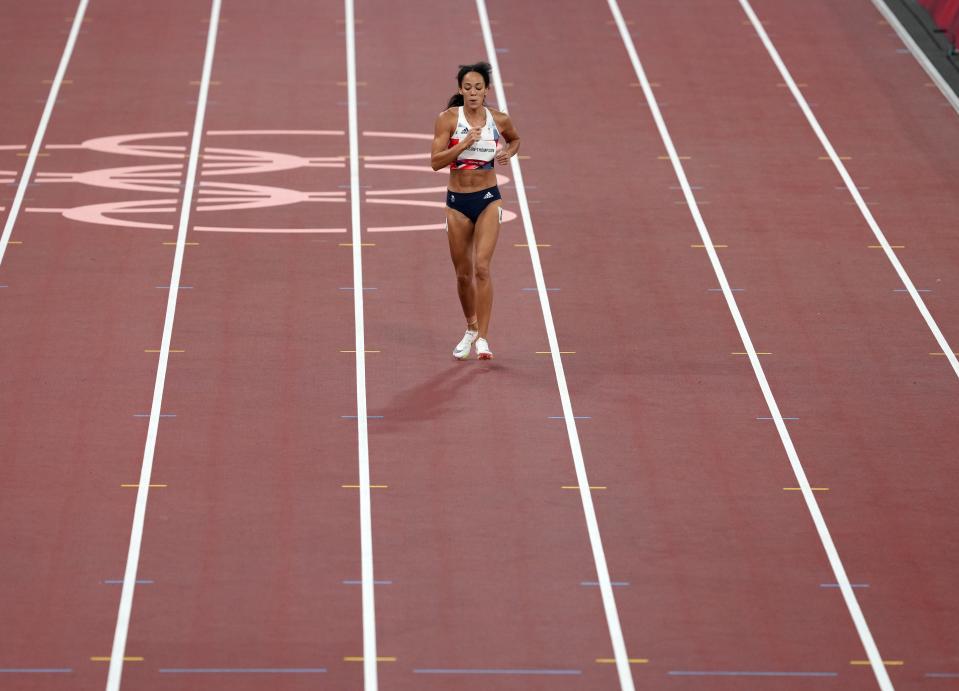Katarina Johnson-Thompson’s Olympic dream ends in injury and agony
She was the third quickest to react to the starter gun. She led into the bend. She finished to acclaim, 68.4 seconds after seventh place was done. In between, Katarina Johnson-Thompson pulled up in her 200m heat, took the weight straight off her right foot, collapsed to the floor and writhed around in agony.
Track-side assistants lingered tentatively as a photographer rushed up from the finishing line. This, for him, was the shot to get for the biggest story. Katarina Johnson-Thompson, a name synonymous with the heptathlon had fallen out of the reckoning and out of the Olympics.
Had the left Achilles gone again? The one that ruptured at the end of 2020? The kick in the teeth after a World Championship in 2019 felt like a marker of potential being fulfilled, not just realised. A marquee title ahead of her third and most high-profile Games.
Maybe it was worse that it wasn’t the Achilles. Doctors confirmed late into the Tokyo evening this was the twang of a right calf. There is no need to rush any diagnoses or recovery though. Because now, there is nothing to rush for. No expectation to bear. No dream to realise. No strict timelines to pick herself up from rock bottom and somewhere back to her peak. Just as well given how much lower she will feel. What was meant to be for Johnson-Thompson has already come and gone. The Paris Games are just three years away, but Tokyo was the one that was meant to be hers.
At the beginning of 2021, Johnson-Thompson assembled a team of doctors, physios, coaches and confidants to insulate her during her rehabilitation. External messages were few and cloudy, but internal ones raw and to the point. They told her the Olympic Games were not off the table but the route to them would be arduous, and with no guarantee. She only heard the first part.
The 28-year old told them, simply, “get me to the start line.” And it was at that start line in the Olympic Stadium on Wednesday morning where she started what looked like being a productive first day of competition.
The promise to her medical staff and coaches was that, once they got her to the line, she would summon something from that concealed well all world-class athletes possess. One that fills up with fight once triggered by the bright lights and global audience. In the opening session, she kept that promise.
She sat third after two events, winning her heat of the 100m hurdles in a time of 13.27, then registering 1.86m in the high jump – a personal best of the most challenging of seasons. Defending Olympic champion Nafissatou Thiam flexed her spring to clear 1.92. The Belgian moved into first and, officially, their battle was on.
Thursday was the day Johnson-Thompson was supposed to cash in, even if not “PB fit” as she put it a couple of weeks ago. Yes, she was not at that 6,981 national record level in Doha, where no one in the field matched her stride or engine in the 800m, the leap of her long jump, or the charge of her 200m. Over the last few weeks, Johnson-Thompson has been tempering our and her expectations. Even so, there was reason to believe two or three notches below her best would still put her in medal contention.

Her shot put of 13.31m to start the evening’s events was nothing special. But it kept her in fifth, close enough for the top three to feel her presence. It helps to have a name that sticks out on a leaderboard in more ways than one. With the final event of Wednesday, she aimed to be back amongst it.
Athletes say Achilles injuries are the worst to recover from because not only can you feel the pain, you can also measure it. The extra seconds in every watered-down run, every lowering of the box jump, every kilo off the squat rack. The under-par 6.10m she achieved in the long jump at the British Grand Prix last month was the first time she had jumped off her usual 19 steps since the injury, and a reminder of how much more she needed to get back.
The emotional tax was evident, too. A media engagement a few weeks ago lacked the usual bubbliness but featured plenty of frowns when “rehab” became a recurring topic of conversation. She dismissed the need to talk about it and later complained to her inner circle. All that was behind her. She just wanted to talk business.
There would have been a moment of clarity as Johnson-Thompson knelt in the starter block. Knowing that she was 24 seconds away – 23-and-a-bit if she pushed it – from putting together a day that once seemed so far away, ahead of another with an opportunity for a medal that looked impossible even a couple of months ago. Complications now behind her.
A strong race would lift her back to the podium, or at least that little bit closer to it. Then onto a restful night sleep, where she already had techniques ready to retain focus to awake on Thursday and know what challenges lay ahead, what levels need to be hit and what she could physically demand of herself. All to achieve an Olympic heptathlon medal of any kind to vindicate the sacrifices of the last year and beyond.

She knew just out of the bend that she was done: face grimacing as the calf seized, the physical pain hitting her first before the emotional pain numbed it. She sat up, tears in her eyes, the willing hands of strangers ready to lift her into the wheelchair close by.
She didn’t dare look at it, instead fixing her gaze ahead to the finish line. Dismissing any help, she got herself up, took a few tentative steps, hopped on her left foot and broke into a jog, her right foot splayed out to bear as little weight as possible.
Hobbling down the track will have brought her some peace. The pride of a track athlete is to finish a race you started. And after the effort to get to the start, reaching the other end will have brought something. Perhaps not glory, but power and strength, at a time when her spirit was vulnerable and body weak.
She was applauded by those in the media gantry running alongside the track. Fellow competitors who watched her finish embraced her before leading her to the comfort of anywhere else. A third Great British star limping out of the limelight.
As she crossed the line, a time of 1min 33.97secs flashed on the screen before a disqualification was confirmed. The misdemeanour? Straying out of lane four as she tossed and turned in the nightmare she was living. It was a neat snapshot of the tragedy that has been one of the most important years of her career. Even at her most defiant, she could not recover on her terms.
Read More
Tokyo 2020 LIVE: Team GB win sailing gold as Ben Whittaker gets silver
How much do Olympic athletes win for gold, silver and bronze medals?

 Yahoo News
Yahoo News 
